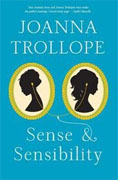Sense and Sensibility
Joanna Trollope
book reviews:
· general fiction
· chick lit/romance
· sci-fi/fantasy
· graphic novels
· nonfiction
· audio books
· author interviews
· children's books @
curledupkids.com
· DVD reviews @
curledupdvd.com
newsletter
win books
buy online
links
home
for authors
& publishers
for reviewers

 |
Sense and Sensibility Joanna Trollope Harper Hardcover 368 pages October 2013 |
|
Trollope hints at the social skewering Austen used to such great effect while also recreating her famous first novel for modern literary tastes. The seeds of the legendary author’s future projects are evident in this outing. Although it initially has trouble deciding what kind of novel it wants to be—alternating between cheeky comedy and the more serious emotional moments—inherent to the story is the plight of the Dashwood girls. Ultimately Trollope’s Sense and Sensibility
Exhausted by a further calamity, by rage at Fanny‘s malevolence and by John‘s feebleness, Belle is terrified at the prospect of a future in which she and her daughters do not even know where they are going or where they will lay their heads. John remains deeply wounded by Belle’s accusation that he has been more than generous, but an eventual savior comes in the form of Sir John Middleton. “[L]ike one of the good-hearted characters from a Dickens novel,” Sir John invites the Dashwoods to come and live with him at Barton Park, his sizable estate nestled deep in the countryside of Devon. The girls accept their new circumstances with as much cheer as they can muster, considering that John and Fanny have unapologetically taken over their family estate and their fortune. Each girl struggles with the aftermath of love and romance and wotj the trials of settling into a new abode. While Belle mourns the loss of her luxurious, aristocratic home, fragile, asthma-afflicted Marianne cannot move past her obsession with dashing “Wills” Willoughby after he rescues her from certain death in rough weather. The fragility of Marianne’s health coupled with the natural intensity of her personality magnifies her appeal for this gorgeous boy who will later come to betray her. Elinor, meanwhile, falls in love with shy, awkward Edward Ferrars even as she is forced again and again to shoulder the crisis besetting them all. Money haunts Elinor: money to buy and run a car, to pay for food and clothes, “and even tiny amounts of fun.” She’s been living in the “cloud cuckoo land” of Norland while attempting to pursue her idiotic, impractical dreams of an architecture career. On impulse, Elinor reacts against the grief and rejection she’s been through, surrendering to stoic Colonel William Brandon, the first of many individuals to hold out a helping hand. Many elements in here form the basis for Trollope’s rich and complex Austen-inspired tapestry of manners: as Marianne acknowledges Wills’ unrequited love, he flirts with the gorgeous daughter of a Greek tycoon. Elinor envies her sister’s ability to abandon herself almost ecstatically to music, to literature “and to love.” Although Elinor mistrusts all that beauty and “all those high spirits,” and given that she thinks money is “a sort of fairy-tale inheritance that belongs in a novel,” she finds herself unprepared for her bourgeoning romance with Edward. As plots and subplots revolve around children, parents, and matrimony past, present and future, John’s gossipy mother-in-law, Abigail Jennings, circles the events in a “plump whirl of capes and scarves.” Her character hints mostly at the delightful social skewering that Austen used to such great effect in her later novels. Shepherding the spirit of Jane (albeit with our 21st century’s ipads, iphones and text messaging), Trollope proves that even in the contemporary world, love and marriage don’t come that easily. Affections are not always returned, and social jockeying sometimes takes precedence over true love. Although the purists may be a bit jarred by a setting that too often feels like a slightly less formulaic Harlequin novel, most readers will enjoy this interesting, lighthearted twist on Austen’s grand, timeless literary legend. Originally published on Curled Up With A Good Book at www.curledup.com. © Michael Leonard, 2013 |
| Also by Joanna Trollope: |
|
|
|
 Click here to learn more about this month's sponsor! |
|
| fiction · sf/f · comic books · nonfiction · audio newsletter · free book contest · buy books online review index · links · · authors & publishers reviewers |
|
| site by ELBO Computing Resources, Inc. | |
 After their darling Uncle Henry dies, Marianne and Elinor, along with little sister Margaret and mother Belle, are no longer able to reside at the ancestral home of Norland Park, an estate of great size and elegant Georgian proportions. Henry left Norland to son John, but at the last moment John decides to ignore his father’s deathbed pleas, succumbing to the selfish desires of his wife, Fanny, “a pure concentration of self-interest.” Fanny is hard as nails and entirely devoted to status and money. She also has firm ideas about who should be residing at Norland. Clearly there is no place for Belle and her three daughters, who are left with little money and no home.
After their darling Uncle Henry dies, Marianne and Elinor, along with little sister Margaret and mother Belle, are no longer able to reside at the ancestral home of Norland Park, an estate of great size and elegant Georgian proportions. Henry left Norland to son John, but at the last moment John decides to ignore his father’s deathbed pleas, succumbing to the selfish desires of his wife, Fanny, “a pure concentration of self-interest.” Fanny is hard as nails and entirely devoted to status and money. She also has firm ideas about who should be residing at Norland. Clearly there is no place for Belle and her three daughters, who are left with little money and no home.